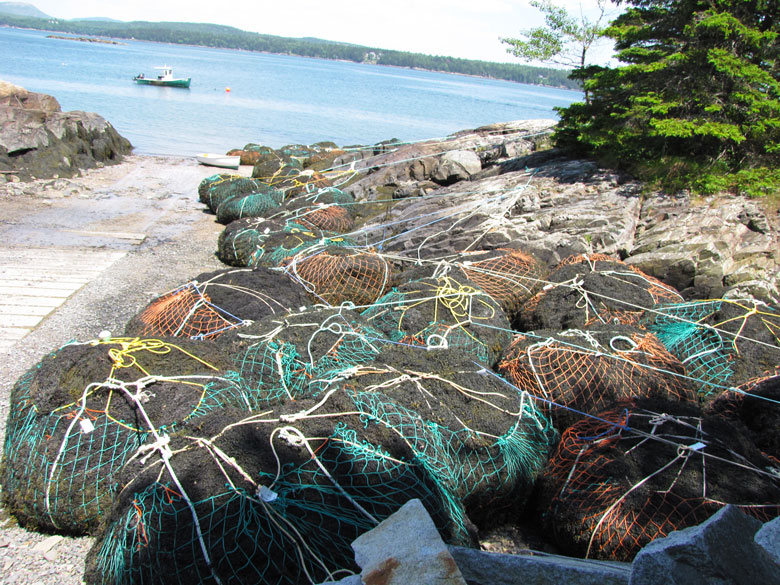In the August issue of The Working Waterfront, David Porter’s letter to the editor correctly noted that the 2019 Ross v. Acadian Seaplants case held that “rockweed is a plant.” The Ross ruling also affirmed the 1986 and 1989 Moody Beach cases holding that the 1647 Colonial Ordinance ceded title to intertidal lands in Maine to adjacent upland owners, subject only to the public’s right to engage in “fishing, fowling, and navigation.”
Ross concluded that the public harvesting of rockweed on intertidal land did not fit any of the permitted public uses spelled out in the ordinance. Accordingly, it affirmed the lower court holding that “rockweed growing in the intertidal zone is the private property of the upland property owners… [it] is not public property, is not held in trust by the state for public use and cannot be harvested by members of the public as a matter of right.”
Upland owners are free to permit this harvesting or to prohibit it. Many have chosen the latter course.
The larger question, however, is whether the Ross case and the underlying Moody Beach cases were correctly decided by Maine’s highest court. Questions of intertidal land ownership and permitted public uses are now before the state Supreme Court in the Peter Masucci, et al v. Judy’s Moody, LLC et al case. An extensive record and briefs are in the court’s hands; oral arguments were heard Oct. 10.
The court will render its decision when it is ready. But these issues (ownership, permitted uses) are not the focus of this response to Mr. Porter.
What is important in Ross is that in the line of Massachusetts and Maine cases challenged in Masucci—such as Storer, Lapish, Barrows, Bell I and II and Ross—the Ross case stands alone in that it is scientifically incorrect. In short, even if the court in the pending Masucci case sustains its prior Bell I and Bell II holdings, the Ross case remains unsupportable. The court should see its continued viability as an embarrassment.
The ink was barely dry on Ross when leading Maine marine and plant biologists pointed out that the holding was scientifically incorrect. Rockweed is not a plant—it is also not a “fish.” It is a “marine organism.”

As such rockweed is much like clams, quahogs, mussels, bloodworms, etc., all found in and on intertidal land, all of which are correctly characterized as “marine organisms.” Importantly, it would be incorrect to characterize any of these “marine organisms” as “fish.” If these organisms are further characterized at all, they are akin to land based birds and wild animals that exist “ferae naturae.” Upland owners in Maine do not own migratory birds, wild turkeys, deer, moose, or bear that may reside for a time on their private property. Nor do they own marine organisms that exist on intertidal land.
Living “ferae naturae” species, whether consisting of birds, wild animals, or marine organisms are universally seen as subject to state protection and regulation to assure their survival, their ongoing benefit to larger ecosystems, and where possible to maximize their economic potential.
Given, that Mr. Porter and others see the Ross case as “supporting Maine’s fishing industry” and “unfettered commercial extraction of Maine’s underwater rockweed” as inimical to this industry, several points should be made.
First, commercial rockweed harvesting in Maine is not “unfettered.” This is a scare tactic. All rockweed harvesting in Maine is licensed by the Department of Marine Resources on location, frequency, and technology. All harvesting requires that “the lowest lateral branches shall remain undisturbed and attached to the main stalk of the rockweed” and “a minimum of 16 inches of the rockweed shall remain above the holdfast.” This facilitates regeneration.
Second, other research by Maine marine scientists makes clear that annual winter freezing and thawing and storm removal of rockweed from North Atlantic shores is as great if not greater than removal by harvesting.
Third: The sustainability of Irish and Canadian rockweed harvesting is particularly well-documented. The key elements are the low exploitation rate of the resource and leaving the basal axis and holdfast of rockweeds intact for regeneration.
In sum, a scientifically unsupportable Ross case will not save Maine’s fishing industry. On the contrary, the Ross holding invites further litigation.
The Ross case should be overruled. The long-standing regulation of all marine organisms on Maine’s intertidal lands are appropriate. They are working. They deserve our continuing support.
Orlando Delogu is former University of Maine School of Law faculty member. He also helped found the Maine Civil Liberties Union, and served on the Board of Environmental Protection, the Portland City Council, and Portland Planning Board.





